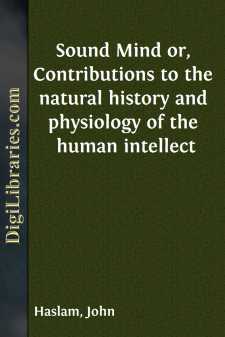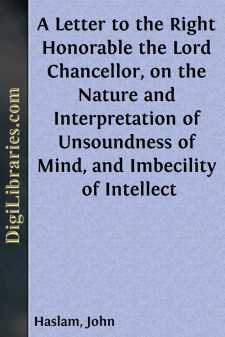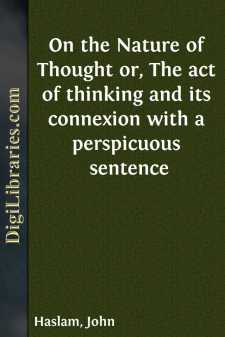Categories
- Antiques & Collectibles 13
- Architecture 36
- Art 48
- Bibles 22
- Biography & Autobiography 813
- Body, Mind & Spirit 142
- Business & Economics 28
- Children's Books 17
- Children's Fiction 14
- Computers 4
- Cooking 94
- Crafts & Hobbies 4
- Drama 346
- Education 46
- Family & Relationships 57
- Fiction 11829
- Games 19
- Gardening 17
- Health & Fitness 34
- History 1377
- House & Home 1
- Humor 147
- Juvenile Fiction 1873
- Juvenile Nonfiction 202
- Language Arts & Disciplines 88
- Law 16
- Literary Collections 686
- Literary Criticism 179
- Mathematics 13
- Medical 41
- Music 40
- Nature 179
- Non-Classifiable 1768
- Performing Arts 7
- Periodicals 1453
- Philosophy 64
- Photography 2
- Poetry 896
- Political Science 203
- Psychology 42
- Reference 154
- Religion 513
- Science 126
- Self-Help 84
- Social Science 81
- Sports & Recreation 34
- Study Aids 3
- Technology & Engineering 59
- Transportation 23
- Travel 463
- True Crime 29
Sound Mind or, Contributions to the natural history and physiology of the human intellect
by: John Haslam
Description:
Excerpt
The indulgence of the public has been already extended to several works which I have submitted to its decision on the subject of Insanity; and the same favourable interpretation is now solicited for the present performance,—which attempts the more difficult investigation of Sound Mind. In treating of Mental Derangement, I became very early sensible, that a competent knowledge of the faculties and operations of the Intellect in its healthy state, was indispensably necessary to him, who professed to describe its disorders:—that in order to define the aberrations, the standard should be fixed. There was indeed no lack of theories and systems of Metaphysic; and although they essentially differed, many possessed the highest reputation. Amidst this distraction of conflicting opinions, which no mediator could adequately reconcile,—without daring to contend with a host of discrepancies, or presuming to demolish the lofty edifices which scholastic Pneumatology had reared,—I determined to throw off the shackles of authority, and think for myself. For it was evident, on the freehold ground of literature, that there is "ample room and verge enough" for every man to build his own tenement;—and the present construction is too lowly to intercept another's prospect, and without those ornaments that might provoke the jealousy, or challenge the rivalship of surrounding inhabitants.
The mind of every rational person may be considered as an elaboratory, wherein he may conduct psychological experiments:—he is enabled to analyze his own acquirement,—and if he be sufficiently attentive, he may note its formation and progress in his children:—and thus trace the accumulation of knowledge, from the dawn of infancy to the meridian of manhood. The prosecution of these means, according to my own views, will qualify the diligent observer, to become the Natural Historian and Physiologist of the Human Mind.
In the comparative survey of the capacities of Man, and the intelligence of animals, the contrast has appeared so striking, that it was impossible wholly to abstain from the inference of his future destination:—notwithstanding very different conclusions had been extorted by some modern physiologists. It has been often remarked, that the practitioners of the healing art, have been very moderately impressed with a solicitude for the future. This observation, in some late instances, has been unhappily confirmed:—but it would be unjust to visit the whole tribe with a sweeping and acrimonious censure, for the transgressions of a few. The reproach has, however, long existed. The venerable father of English poetry, in his description of the Doctor, has passed a high and merited compliment to his learning; which at that period was a heterogeneous compound of Greek, Latin, and Arabian lore, mysteriously engrafted on Galenicals and Astrology:—yet with this courteous concession to his professional science he could not refrain from a dry and sarcastic memorandum, that
"His study was but little in the Bible."Throughout this inquiry, the province of the Theologian has never been invaded:—it has been my humble toil to collect and concentrate the scattered rays which emanate from natural reason,—a pale phosphoric light, and "uneffectual" glow, compared with the splendid and animating beams, which issue from the source of divine communication.
As the object of these contributions, has been principally to convey my opinions, concerning the formation of the human mind, from the superior capacities that man possesses, many subjects have been left untouched, which, in similar works, urge an important claim to the attention of the reader. Among these neglected articles, the Imagination is the chief omission:—of which many authors have treated so copiously, and so well. According to my own views, the consideration of this faculty was not essential to the outline that has been traced;—and it has been rather deemed a graceful embellishment, than a constituent pillar of the edifice of mind. This gay attirer of thought, that decks passion and sentiment, is also the prolific parent of fiction;—and justly banished from the retreats of sober demonstration.—To the science of numbers,—to mathematical precision, and to the whole range of experimental philosophy,—Imagination does not lend her glowing and gaudy tints. No vestiges of her colouring can be discovered in Divine ordinances, or in the systems of human jurisprudence:—neither in the Ten Commandments nor in the Statutes at Large....




